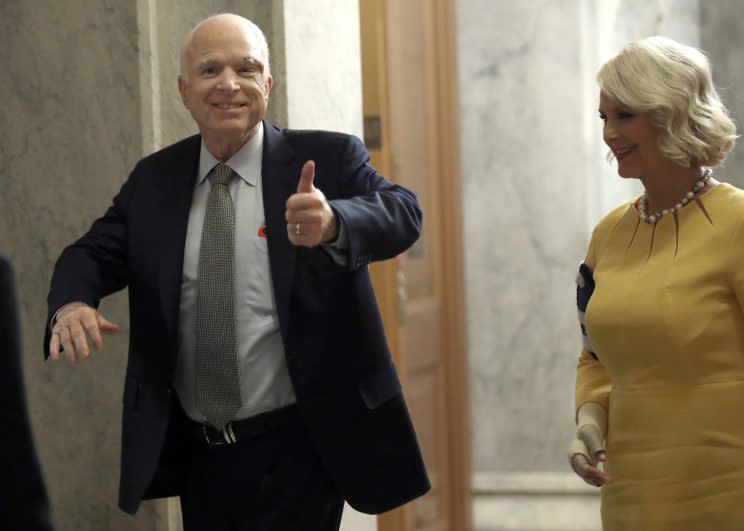Senate GOP moves forward on health care bill in dramatic procedural vote
WASHINGTON — Over the sound of protesters crying “kill the bill,” 50 Republican senators cast their votes to begin debate to repeal Obamacare on a razor-thin margin Tuesday afternoon. Sen. John McCain, R-Ariz. — who was recently diagnosed with brain cancer — cast the 49th “yes” vote after making a dramatic entrance back to the Capitol, greeted by applause from his colleagues.
Vice President Mike Pence cast the tie-breaking vote to begin the debate. No Democrats backed the measure.
Though the motion to proceed is a victory for Sen. Majority Leader Mitch McConnell, McCain gave a speech directly afterward the vote that threw cold water on the chances that Senate Republicans would emerge in the next few days with a bill that overhauls the nation’s health care system.
“I will not vote for the bill as it is today,” McCain said. “It’s a shell of a bill right now; we all know that.”
He urged McConnell to return to the “old ways of the Senate” — letting senators craft a replacement bill in the regular, bipartisan committee system instead of entirely behind closed doors.
McConnell managed to flip a handful of holdout senators who expressed deep skepticism about the procedural vote and who nearly killed the repeal-and-replace debate altogether two weeks ago. Of about eight of those senators, only Sens. Susan Collins, R-Maine, and Lisa Murkowski, R-Alaska, voted against starting debate Tuesday. The rest of the caucus fell into line, including Sen. Dean Heller, R-Nev., who is up for reelection next year in a state Hillary Clinton won in 2016.
But now McConnell faces the daunting task of getting 50 of his members to agree on an actual bill — a project he’s had trouble with so far.
The senators will hold votes on a “clean repeal” of Obamacare that would begin in two years, as well as an updated version of repeal-and-replace that has not been released publicly. They also may vote on a “skinny” version of repeal that would solely abolish one of the Obamacare taxes and the individual and employer mandates without making any larger fixes to the law, according to Sen. Rand Paul, R-Ky.

The Congressional Budget Office has predicted that versions of these plans would cause huge increases in the number of Americans without health insurance, which is one reason the GOP’s repeal effort has been unpopular thus far.
“It’s wide open for amendment; different people have different ideas about what form it should take,” McConnell told reporters Tuesday.
It’s unclear if McConnell will be able to win over 50 senators to back any one of these plans. The Senate’s moderates have sounded skeptical of a repeal-only plan, while conservatives and moderates still have objections to the repeal-and-replace measure. Crucially, the Senate parliamentarian has ruled that several provisions of the Senate’s repeal and replace draft would take 60 votes to pass, meaning that bill is effectively dead.
“Obviously we have our work cut out for us,” said Sen. John Thune, R-S.D., a member of the leadership team. “We cleared the first hurdle, but there’s obviously a lot of work to be done.”
During a joint appearance in the Rose Garden with Lebanese Prime Minister Saad Hariri, Trump called the vote a “big win” and predicted it was the “beginning of the end” of Obamacare.
In an earlier interview, Trump acknowledged the difficulty McConnell faced going forward.
“It’s a very, very difficult situation,” President Trump told the Wall Street Journal Tuesday, “because you move a little to the left, and you lose four guys. You move a little bit to the right, and all of a sudden you have a bloc of people who are gone. You have a one-inch road and it wheels through the middle of the valley.”
The Senate will have up to 20 hours to debate and vote on these measures, and then an open amendment process, called a vote-a-rama, will likely begin Thursday. A vote on the final package could come as soon as Thursday night, according to Sen. Johnny Isakson, R-Ga.
—Yahoo News reporter Andrew Bahl contributed to this report.


